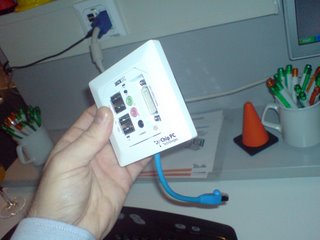 A big part of green computing is winning hearts and minds. Take that thing on the right, for example - see that? That's your new computer. That's because the desktop is going away. Maybe. Sometime. Many people have a hard time even thinking that thought.
A big part of green computing is winning hearts and minds. Take that thing on the right, for example - see that? That's your new computer. That's because the desktop is going away. Maybe. Sometime. Many people have a hard time even thinking that thought.
Another issue is related to the sharing of computer resources. This is something that is really taking off, particularly in virtualization. The problem here that a lot of business models can't account for this. According to Richard Curran of Intel:
"Virtualisation raises questions of politics, such as who owns the servers, who pays for them and who manages them... "They have to start thinking of the data centre as a shared capability, a service, not a room housing 'my box'."
Truer words were never spoken; however, it seems like sharing is left to children. But it seems like the virtualization is really where the server room is headed. Maybe. Sometime.
Finally, we have the changing of the operating system from Microsoft to Linux. Some folks think it is inevitable. Some have already done it. And eventually everyone will do it. Maybe. Sometime.
 By now, everyone knows that power costs are going to eat up one third of your IT budget in the next few years. Or maybe it's 40 percent of your budget. Fact is, no one really knows. But, as the saying goes, that's the problem with predicting the future; it hasn't happened yet.
By now, everyone knows that power costs are going to eat up one third of your IT budget in the next few years. Or maybe it's 40 percent of your budget. Fact is, no one really knows. But, as the saying goes, that's the problem with predicting the future; it hasn't happened yet.
But one thing you can be sure of is that vendors are going to duke it out as to who is the most energy efficient. Are Sun's Cool Threads really cool? Maybe not. How about Angstrom's Liqucool technology, which they claim will reduce energy use in the data center by 40 to 60 percent. One can even argue the whole debate is moot, because heating is good in cold climates anyways. Finally, HP and IBM are at it over their blade servers. Again.
Fact is, there is a simple litmus test for all of this - the first vendor to mention TCO loses. You know why? Because that means they are trying to bury their equipment's performance in the quagmire of IT, that discipline where 80 percent of initatives aren't even scoped out because 'IT is too complicated.' Bull. Plug a meter into it and give me the numbers.
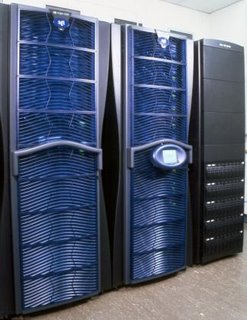 Supercomputers have been around since 1920, when IBM built custom tabulators for Columbia University. Nowadays they do just about everything from predicting weather to playing the stock market.
Supercomputers have been around since 1920, when IBM built custom tabulators for Columbia University. Nowadays they do just about everything from predicting weather to playing the stock market.
High-performance computing has (obviously) always been performance oriented. However, environmentalism is sneaking in here as well (some say the hippies are driving it), as supercomputing centers use vast amounts of energy. And, since peak performance is rarely attained, some of this energy consumption results in little or no performance gain. The problem is beginning to be studied; there is even a conference devoted expressly to this issue. There is also a site called Green 500 that ranks all of the supercomputers in the world by how ecofriendly they are. Like others, they are trying to determine the best way to do this, they have an RFC if you would like to contribute.
 Here's my second post in a continuing series of posts related to what the other guy is doing in green computing. I'm finding that there are so many stories on green computing recently that it's hard to even list them all. Here are some good ones:
Here's my second post in a continuing series of posts related to what the other guy is doing in green computing. I'm finding that there are so many stories on green computing recently that it's hard to even list them all. Here are some good ones:
IBM - they have announced their "Big Green" innovation plan with $100 million in funding. Also, the IBM blade servers are racking up efficiencies of up to 30 percent more than traditional servers.
Microsoft - Happen to be building aggressive, energy saving technology into Vista, primilarily by putting them to sleep after an hour. I don't see this as a big deal, SA's can do this now; in fact, one might see it as paternalistic. It will, however, save about 5 to 7 billion a year.
VMWare - is now offering businesses rebates between $750 and $1350 for every server that they unplug. Wow.
Final good news - Spending on green IT initiatives is up to 21 percent.
 It looks like Great Britian is taking the lead in legislating power consumption into action, particulatly with the climate change bill currently being proposed. This is hopeful, especially when a recent survey also reported than about 20 percent of IT dollars in selected European countries are going towards funding green IT initiatives.
It looks like Great Britian is taking the lead in legislating power consumption into action, particulatly with the climate change bill currently being proposed. This is hopeful, especially when a recent survey also reported than about 20 percent of IT dollars in selected European countries are going towards funding green IT initiatives.
It makes sense that England is doing this; energy is running about 7-7.1 (~14 cents) pence per kilowatt-hour there, and they don't have lot a lot of oil, or oil-related reserves to draw upon. Moreover, England has less and less influence to acquire them in the world market. I wouldn't be surprised if others countries follow suit quickly.
 You don't often think of environmental regulations when it comes to purchasing electronic equipment. But they're coming, and they are coming fast. The WEEE directive is one of the big daddies that is getting the ball rolling. WEEE is mandated in Europe and must be compiled with by July 2007. The sad thing is that 25 percent of IT directors are unaware of WEEE, and 40 percent don't understand what it means. The short of it is that it means two things. One, you will need to deal with your IT waste or be fined for improper disposal. Two, there is more of this coming; WEEE is mandated in Europe, but other countries are rapidly creating their own 'WEEE-like' laws. England, for example, is ready to ban the incandescent light bulb. Use any of those?
You don't often think of environmental regulations when it comes to purchasing electronic equipment. But they're coming, and they are coming fast. The WEEE directive is one of the big daddies that is getting the ball rolling. WEEE is mandated in Europe and must be compiled with by July 2007. The sad thing is that 25 percent of IT directors are unaware of WEEE, and 40 percent don't understand what it means. The short of it is that it means two things. One, you will need to deal with your IT waste or be fined for improper disposal. Two, there is more of this coming; WEEE is mandated in Europe, but other countries are rapidly creating their own 'WEEE-like' laws. England, for example, is ready to ban the incandescent light bulb. Use any of those?
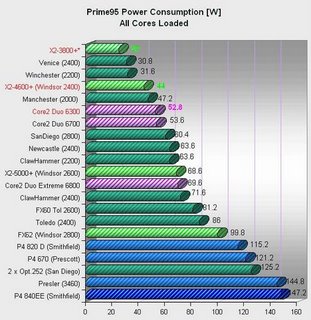 There has been quite a battle between the chip makers for some time now. It seems like each manufacturer is taking a different strategy when it comes to going green. What is interesting is that they are all going green, which is pretty exciting in itself. Here's a rundown:
There has been quite a battle between the chip makers for some time now. It seems like each manufacturer is taking a different strategy when it comes to going green. What is interesting is that they are all going green, which is pretty exciting in itself. Here's a rundown:
VIA - The new guy on the block, seems to have a holistic marketing strategy. Their chips are low power, they offset the carson emissions on the chip, and now they are working in South Africa to bridge the digital divide. Definitely the crunchiest of the bunch, doing the most.
Intel - I don't know what is going on with these guys frankly. Definitely very much into the new multicore offerings that are rolling off the assembly line. These bode well for the future as the designers will have more silicon than they know what to do with, and the 5,000 core CPU is already within reach. In fact, Intel has already done the 80 core chip. But ultimately, Im not sure if this saves energy or puts all of your processing power in one place. They say it does.
AMD - probably the most recognized brand for energy efficient chips, definitely helped their their affiliation with Sun. Ironically, Sun is pushing their green campaign and AMD is mostly riding on their coattails, when in fact most of the energy savings of the Sun products comes from the AMD chips!
 Dan Briody is jealous of Dave Douglas, the VP of eco-responsiblity at Sun. Because it's such a cool job. And also the fact thats what Sun is pushing is so inevitably the future that he wants to be a part of it. Also add in Ed Cone, who also sees the massive benefits to the green revolution. Now if just the business owners could...
Dan Briody is jealous of Dave Douglas, the VP of eco-responsiblity at Sun. Because it's such a cool job. And also the fact thats what Sun is pushing is so inevitably the future that he wants to be a part of it. Also add in Ed Cone, who also sees the massive benefits to the green revolution. Now if just the business owners could...
 Computers, that is. In the entire world. At least, that's what Greg Matter from Sun thinks. And I don't think he too far wrong.
Computers, that is. In the entire world. At least, that's what Greg Matter from Sun thinks. And I don't think he too far wrong.
Here's a quote to flesh this out (from Greg):
I'm just saying that there will be, more or less, five hyperscale, pan-global broadband computing services giants. There will be lots of regional players, of course; mostly, they will exist to meet national needs. That is, the network computing services business will look a lot like the energy business: a half-dozen global giants, a few dozen national and/or regional concerns, followed by wildcatters and specialists.
I seriously agree with him. As I have said several times before, we only need one email provider in the world. Just one, that's it. Google is my choice. No more spam, no more huge bandwidth requirements. Just logon to Google and type.
 Nicholas Carr has a lovely article on something he calls Frugal Computing. First, I love the catchphrase - it's fresh and new, a little bit of a downer (who wants to be frugal), but I like it anyways. To quote from a quote, Carr mention that Gilder mentioned that;
Nicholas Carr has a lovely article on something he calls Frugal Computing. First, I love the catchphrase - it's fresh and new, a little bit of a downer (who wants to be frugal), but I like it anyways. To quote from a quote, Carr mention that Gilder mentioned that;
George Gilder writes that "in every era, the winning companies are those that waste what is abundant – as signalled by precipitously declining prices – in order to save what is scarce." What is abundant today, he argues, is information technology - in particular, computing cycles, data storage, network bandwidth. Google, writes Gilder, operates a "massively parallel, prodigally wasteful petascale computer" in order to be "parsimonious with that most precious of resources, users' patience."
This really does cut to the issue, all this computer equipment is implemented to preserve user patience. The problem is that these days, no one really knows what patience is when it comes to computing. When I started using computers in grade school, I used to lug home these huge terminals, which you connected to the mainframe via a telephone line. I remember 300 baud where you could read the data off the screen as it was being typed. I distinctly remember 19,200 as well, because at that speed the whole screen would fill up with text almost immediately. And I thought, wow, this is great.
I also remember 25 Mhx processors, where doing anything even remotely interesting took several days to run. Where creating a zip file took 2 or 3 hours. You had to be careful because one mistake could be hours or days wasted.
As Carr notes, things have advanced so much that now things like processing power, hard drive space, and network capacity are 'free', and are treated as such. The problem is is that they are really not. It reminds me a lot of the meatpacking industry, where the steak is just served up on the plate. No one really cares how it is delievered, until, of course, you can't get steak.
 Well, he's just your local friendly IT wizard. Or he could be the guy that fixes your machine. Or the guy that programs the accounting system. Or maybe he's the guy that manages your IT department.
Well, he's just your local friendly IT wizard. Or he could be the guy that fixes your machine. Or the guy that programs the accounting system. Or maybe he's the guy that manages your IT department.
He's your local witch doctor. Typically he does much more dancing than work. I'm not saying every department has a witch doctor (in fact, most don't), but it only takes a few to leave a big impression. Just look at that guy!
 to be inefficent. At least, that's what the British government is saying by proposing to outlaw traditional light bulbs in three short years. Now, this is the start of something big for the electronics industry. I can see a not too distant future where governments start outlawing inefficient processors, inefficient laptops, monitors filled with lead, etc. More and more, my hope in government is restored!
to be inefficent. At least, that's what the British government is saying by proposing to outlaw traditional light bulbs in three short years. Now, this is the start of something big for the electronics industry. I can see a not too distant future where governments start outlawing inefficient processors, inefficient laptops, monitors filled with lead, etc. More and more, my hope in government is restored!
 I enjoy tracking the progress towards the green IT goal. Every so often, I see a few things here and there where I think 'now there's a milestone'. A lot of times they are related to a huge company doing something that you have never heard of them doing before. Here are a few of those.
I enjoy tracking the progress towards the green IT goal. Every so often, I see a few things here and there where I think 'now there's a milestone'. A lot of times they are related to a huge company doing something that you have never heard of them doing before. Here are a few of those.
- Home Depot, for example, is starting to sell solar panels to mainstream America.
- Staples is now offering environmentally friendly paper. This is not too surprising, but that fact that the product is certified by the Forest Stewardship Council is, because they take into account certain non-business elements such as indigenous peoples' rights and community relations.
- VIA's carbon free computing campaign is impressive.
- Finally, Al Jazerra themselves have said that energy consumption will be one of the primary components in triggering ecosystem collapse. Now, that's a new angle!
- Oh, and half of Europe lost power today. Not for the last time.
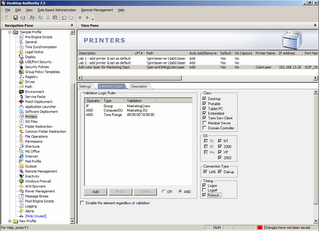 Green Business News often has stories related to green IT. They have a nice review on a product from ScriptLogic called Desktop Authority. DA does many things, but one of the things is power managment. And with 36 percent of all desktop being left on all night long, that's probably something that could save big bucks.
Green Business News often has stories related to green IT. They have a nice review on a product from ScriptLogic called Desktop Authority. DA does many things, but one of the things is power managment. And with 36 percent of all desktop being left on all night long, that's probably something that could save big bucks.
After seeing a lot of these types of products, I'm convinced that the decision to leave a computer on all night long is a primitive one. By that, I mean that I think people really do think about turning off their computer; in fact, I think most people think about doing it every single day. But the decision to not turn it off is primal, a classic short term gain over long term benefit trade off. And since it cost employees nothing to leave their machine on, all's it takes is just one more tiny thing to make the decision ("I might need it bright and early in the morning, fast!") Again, I think most people make this decision every day.
A lot of IT decisions really boil down to just two options - you can change people's behavior, or you can have a machine solve the problem. Often I have found that the slant is towards the machine. If you feel you really need desktops (and there are many compelling arguments why you dont), it seems like you will need one of these software packages as well. The danger is that your employees may be less inclined to activitely contribute to your green efforts if they see the Technological Fix being applied, which will leave them powerless. And as we all know, something without power doesn't run very well.
 Leadership is something that is never in large supply. To be a leader, you have to see things that others don't see; so, almost by definition, there just aren't a lot of leaders around at any given moment.
Leadership is something that is never in large supply. To be a leader, you have to see things that others don't see; so, almost by definition, there just aren't a lot of leaders around at any given moment.
That's too bad, because what we really need right now in IT is people who can take the green football and run with it. It's really getting down to the time where it's no more business as usual; things are changing, and if you don't change, well, someone else will make you change. And that someone else is going to be the government. In a report commissioned by the UK Government and headed by ex-Chief Economist of the World Bank Nicholas Stern, it was estimated that approximately 20 percent of all economic activity is going to vanish due to man made global warming. Politicans, for all the evil they might do, just aren't going to let that happen; they are going to prevent it by doing what they do best, which is regulate the tarnish out the industries that are causing the problem. And that industry, front and center, is IT.
WEEE and RoHS are just the beginning on this one. Politicans are going to look at numbers like these, where 30 percent of the UK power is going towards running ofice equipment and they are going to act, and not in a slow way. In like a punitive way, a way that lets them tax the tarnish out of business and lets the money flow into public coffers. And I promise you, they don't take prisoners, don't care if you go bankrupt or not.
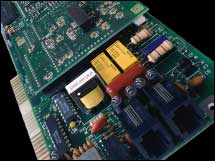 Sales of PC boards have dropped dramatically. This year there was only 8.8 percent growth, down from a historical average of 15 percent. Henry King, the analyst at Goldman Sachs, had this to say:
Sales of PC boards have dropped dramatically. This year there was only 8.8 percent growth, down from a historical average of 15 percent. Henry King, the analyst at Goldman Sachs, had this to say:
"While we maintain our positive view on Vista's impact on the PC upgrade cycle for the next three years, we believe Vista has shifted (fourth-quarter motherboard) seasonality to early 2007," King said.
Positive View, that the key phrase here. These new operating systems seem to get churned out just in time to save the associated hardware industry. But the question you have to ask yourself is - is this the right move for you?
 Walmart is going to start selling these notebooks, dubbed the "world's most efficient laptop", they clock in at just 12 watts. This wouldn't be be such a bad energy slave to have around, the specs are fine for most work and I bet the battery life is fantastic.
Walmart is going to start selling these notebooks, dubbed the "world's most efficient laptop", they clock in at just 12 watts. This wouldn't be be such a bad energy slave to have around, the specs are fine for most work and I bet the battery life is fantastic.
 The EPA has just upgraded the energy star requirements for PCs. It's the first upgrade since July of 2000 for the standard. The article I read made it seem like a joint announcement with Intel, who is clearly the worst offender when it comes to processor power usage. The spec is here, the list of qualified computers is here. Guess who makes most of the computer on the list? Our old friend Apple, who Greenpeace just bashed up a bit for being non-eco friendly. The irony abounds.
The EPA has just upgraded the energy star requirements for PCs. It's the first upgrade since July of 2000 for the standard. The article I read made it seem like a joint announcement with Intel, who is clearly the worst offender when it comes to processor power usage. The spec is here, the list of qualified computers is here. Guess who makes most of the computer on the list? Our old friend Apple, who Greenpeace just bashed up a bit for being non-eco friendly. The irony abounds.
 Lem Bingley has some words of wisdom concerning how go about getting your green purchasing plan going. For starters, don't let employees get stuck in the 'the problem is too big, we can't fix it' mentality. Every little bit helps. Lem also has these observations:
Lem Bingley has some words of wisdom concerning how go about getting your green purchasing plan going. For starters, don't let employees get stuck in the 'the problem is too big, we can't fix it' mentality. Every little bit helps. Lem also has these observations:
IT managers wanting to make a difference face two problems. Firstly, corporate bean counters won't wear purchases made on the basis of a fondness for hugging trees. This is why the WEEE directive is welcome, because it connects green issues to concrete cost factors. But the bigger problem is that environmental impacts are very hard to quantify.
The first I have covered repeatedly; profit and environmentalism have merged (See Yogurt Bombs.) The second is quantification of the benefits. Bingley makes a great analogy to cars by mentioning that the most enviromentally friendly car you can buy in America is the Jeep Wrangler because it is locally made and produced. Obviously the mantra Reduce, Reuse, Recycle applies here. You might want to read these tips on taking the lead on green IT as well.
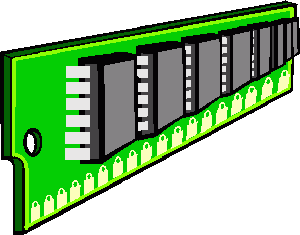 many years ago I had an NT 4 Adminstration Manual written by Mark Minasi. In one part, he was talking about how you will need to create swap files on your hard disk because you couldn't buy enough memory. He joked "Where are those 1 GB chips?"
many years ago I had an NT 4 Adminstration Manual written by Mark Minasi. In one part, he was talking about how you will need to create swap files on your hard disk because you couldn't buy enough memory. He joked "Where are those 1 GB chips?"
Well, they are here. And the second joke is that in order to run Vista you will need two of them. Obviously the start of the next cycle where IT managers are persuaded to throw out every single machine the company owns to install the new operating system.
Sadly, there are a lot of middle managers in IT who love this stuff - crack open the pork barrel, lots more money coming in for hardware and software upgrades, and our staffs will be busy for the next year too. This really does nothing except further turn IT into a janitorial function; what they really should be doing is being the spearpoint for other technologies such as solar, wind, alternative energies, because they are the group that is most equipped to embark on these endeavors. Upgrading to Vista? The joke is almost certainly on you.
 A big part of green computing is winning hearts and minds. Take that thing on the right, for example - see that? That's your new computer. That's because the desktop is going away. Maybe. Sometime. Many people have a hard time even thinking that thought.
A big part of green computing is winning hearts and minds. Take that thing on the right, for example - see that? That's your new computer. That's because the desktop is going away. Maybe. Sometime. Many people have a hard time even thinking that thought.

















